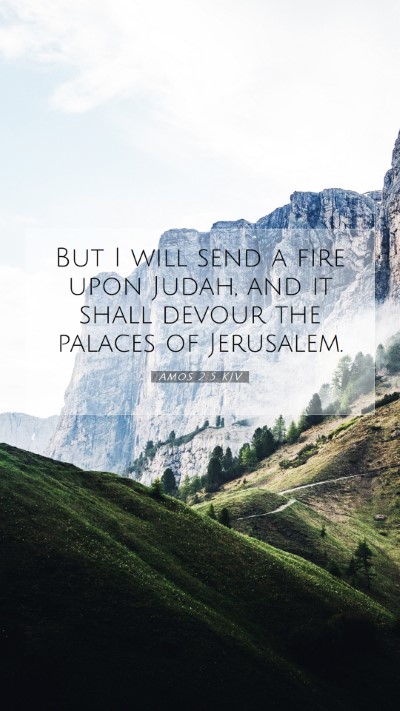Old Testament
Genesis Exodus Leviticus Numbers Deuteronomy Joshua Judges Ruth 1 Samuel 2 Samuel 1 Kings 2 Kings 1 Chronicles 2 Chronicles Ezra Nehemiah Esther Job Psalms Proverbs Ecclesiastes Song of Solomon Isaiah Jeremiah Lamentations Ezekiel Daniel Hosea Joel Amos Obadiah Jonah Micah Nahum Habakkuk Zephaniah Haggai Zechariah MalachiAmos 2:5 Meaning
What is the meaning of Amos 2:5?
But I will send a fire upon Judah, and it shall devour the palaces of Jerusalem.
Amos 2:5 Bible Verse Meaning
Amos 2:5 - Understanding This Powerful Verse
Verse: "But I will send a fire upon Judah, and it shall devour the palaces of Jerusalem." (Amos 2:5)
Introduction to Amos 2:5
The Book of Amos presents a strong prophetic message concerning the impending judgment over the nations, particularly focusing on Israel and Judah. This particular verse, Amos 2:5, serves as a vivid representation of God's judgment and implies a significant warning to His people. In this analysis, we will explore the meaning of this verse by combining insights from notable public domain commentaries to facilitate a deeper understanding of Scripture.
Composite Meaning from Various Commentaries
Matthew Henry's Commentary
Henry highlights that God's judgment is not arbitrary but rather a direct response to the sins and transgressions of the people of Judah. He notes the metaphor of "fire," which signifies destruction and divine wrath. This judgment is indicative of God's displeasure and the inevitability of consequences resulting from national sins.
Albert Barnes' Notes
Barnes emphasizes the seriousness of judgment. The "fire" symbolizes a consuming force that will reach the "palaces of Jerusalem." This indicates that even the highest places of power and influence will not escape divine retribution. He connects this verse to the larger narrative of God’s justice, asserting that the palatial establishments would serve as a reminder of the nation's moral decline and the consequent destruction that follows sin.
Adam Clarke's Commentary
Clarke points to the notion of "devouring" as a complete annihilation or destruction. He interprets the prophecy as a clear indicator of God's impending judgment directed at Judah for their rebellion and idolatrous practices. He contextualizes the historical backdrop of Jerusalem's fortified cities, which seemed invulnerable but were ultimately subject to divine judgment, reinforcing the concept that no earthly power can withstand God’s will.
Historical and Theological Context
This warning from Amos comes during a period of prosperity in Israel, yet deep moral decay and social injustices permeated the society. The historical context highlights the Assyrian threat and the decline of Judah’s spiritual fidelity. In recognizing that the divine fire represents God's active role in history, believers are urged to reflect upon their own lives and the potential consequences of societal and personal sins.
Modern Application and Relevance
Amos 2:5 not only conveys a dire warning to the people of Judah but also serves as a lesson for contemporary society. It urges us to examine the foundations of our governance, our societal norms, and our personal ethics. The verse calls out against complacency in faith, encouraging believers to remain vigilant, ensuring that their lives align with the principles set forth in Scripture.
Cross References
- Jeremiah 17:27: A call to obedience and a warning of destruction for disobedience.
- Lamentations 1:13: A depiction of God's wrath as fire consuming the city.
- Ezekiel 22:31: God's judgment upon a corrupt nation.
Conclusion
Amos 2:5 serves as a pivotal scripture for understanding God's justice and the prophetic warnings against sin. The combined analyses from esteemed commentators elucidate the depth of this verse, offering insights for Bible study groups and individuals seeking to engage in serious Bible study insights and scripture analysis. Understanding the implications of such biblical verses enlightens the believer in both the historical context and its application to modern life, underscoring the timeless nature of God’s word.
Further Study Suggestions
For those interested in delving deeper, consider exploring:
- The historical context of the Book of Amos to understand the societal issues addressed.
- Comparative analysis of Prophetic books to identify themes of judgment and restoration.
- Interactive Bible study tools that facilitate in-depth engagement with difficult passages.


